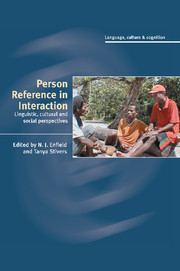Book contents
- Frontmatter
- Contents
- List of contributors
- Preface
- Acknowledgements
- 1 Person reference in interaction
- Part I Person reference as a system
- 2 Two preferences in the organization of reference to persons in conversation and their interaction
- 3 Optimizing person reference – perspectives from usage on Rossel Island
- 4 Alternative recognitionals in person reference
- 5 Meanings of the unmarked: how ‘default’ person reference does more than just refer
- Part II The person reference system in operation
- Part III The person reference as a system in trouble
- References
- Index
2 - Two preferences in the organization of reference to persons in conversation and their interaction
Published online by Cambridge University Press: 22 September 2009
- Frontmatter
- Contents
- List of contributors
- Preface
- Acknowledgements
- 1 Person reference in interaction
- Part I Person reference as a system
- 2 Two preferences in the organization of reference to persons in conversation and their interaction
- 3 Optimizing person reference – perspectives from usage on Rossel Island
- 4 Alternative recognitionals in person reference
- 5 Meanings of the unmarked: how ‘default’ person reference does more than just refer
- Part II The person reference system in operation
- Part III The person reference as a system in trouble
- References
- Index
Summary
Introduction
Research into the social organization of conversation has, as one type of product, the isolation of a ‘preference’ operating for some domain(s) of conversation and the depiction of the organizational machinery through which that preference is effected. A variety of such preferences and their organizational instruments have been studied. It regularly turns out that several of them are concurrently relevant, concurrently applicable and concurrently satisfied.
However, on some occasions in which some such two preferences appear to figure, the actually produced talk does not concurrently satisfy them. Examination of such materials is particularly useful. They can, for example, give support to the proposal that separate preferences are involved, a possibility that the regularity of their concurrent satisfaction obscures. Furthermore, examination of such materials permits the extraction of a ‘second-order’ organization directed to an integration of preferences on occasions when their potential concurrent satisfiability is not realized.
The study of various such second-order devices suggests that they do provide resources that organize adjustment of the concurrently applicable preferences when both are not satisfiable. What is more interesting is that the second-order devices themselves represent types of solutions, a common one being to prefer satisfaction of one of the applicable preferences, and the other being relaxed to such a point as will allow the preferred to be achieved: The non-preferred of the two is not suspended but ‘relaxed step by step’.
Information
- Type
- Chapter
- Information
- Person Reference in InteractionLinguistic, Cultural and Social Perspectives, pp. 23 - 28Publisher: Cambridge University PressPrint publication year: 2007
Accessibility standard: Unknown
Why this information is here
This section outlines the accessibility features of this content - including support for screen readers, full keyboard navigation and high-contrast display options. This may not be relevant for you.Accessibility Information
- 27
- Cited by
